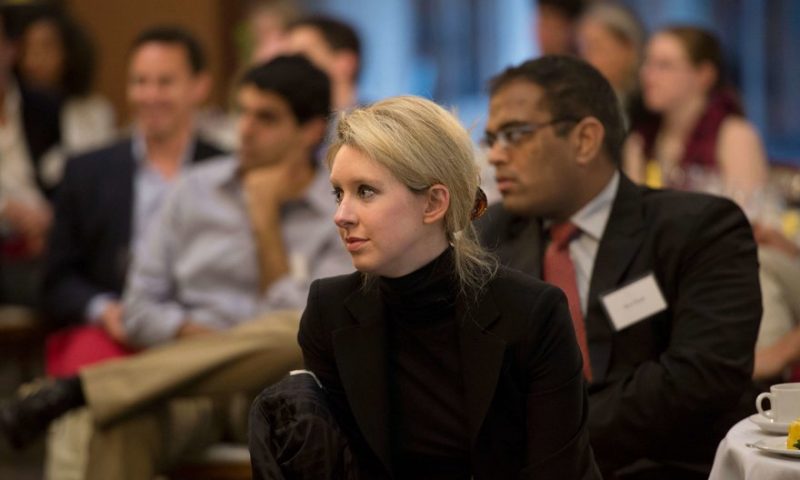More than three years after Elizabeth Holmes and Ramesh “Sunny” Balwani were indicted by a federal grand jury for their efforts to raise hundreds of millions of dollars to develop and distribute blood-testing technology that didn’t exist, Holmes’ trial has finally begun.
The proceedings kick off Tuesday in San Jose, California, with the first round of jury selection. Once that’s complete, the trial is slated to commence Sept. 8 and is expected to continue for the next four months until January 2022, at which time Balwani’s trial will begin.
Holmes and Balwani—the CEO and chief operating officer, respectively, of defunct diagnostics startup Theranos—face nine counts of wire fraud and two counts of conspiracy to commit wire fraud. The charges carry a maximum sentence of 20 years in prison and fines of $250,000 plus restitution for each of the 11 counts. Both have pleaded not guilty to all charges.
The trial begins years after its initial proposed start date, delayed first to give the defense more time to prepare, then because of the COVID-19 pandemic, and finally, in March of this year, to allow time for Holmes to give birth to her first child with hospitality heir Billy Evans, who she’s believed to have married in secret in 2019.
Throughout Holmes’ trial, federal prosecutors will draw from a list (PDF) of hundreds of possible witnesses, including high-profile Theranos backers like Henry Kissinger, Rupert Murdoch and former U.S. Secretary of Defense James Mattis. In total, the company’s investors are estimated to have lost more than $600 million.
Also expected to take the stand are several individuals who actually underwent testing with the company’s faulty technology, resulting in what they say were misdiagnoses of HIV, miscarriages and more, NPR reports.
Holmes’ defense, meanwhile, will reportedly focus on convincing jurors that the claims she made to investors, patients and corporate partners such Walgreens—that the benchtop Edison testing machine was able to run hundreds of assays on just a few drops of blood, when, in fact, the company had been wholly unsuccessful in developing the technology—are not evidence of a deliberate fraud scheme, but the optimism of an ambitious startup leader.
In addition, according to newly unsealed court documents obtained by NPR, Holmes will allege that Balwani, her semi-secret boyfriend throughout Theranos’ reign in Silicon Valley, was physically and emotionally abusive. In the documents, Holmes’ legal team outlined her claims that the alleged abuse and manipulation severely impacted her state of mind and diminished her decision-making abilities during her time at Theranos’ helm and have since resulted in post-traumatic stress disorder, depression and other mental health conditions. Balwani has denied the allegations of abuse.
As Holmes’ trial finally begins, here’s a brief recap of the rise and fall of Theranos, from its peak as a Silicon Valley darling to its current status as cautionary tale turned punchline:
2003: Holmes, at 19 years old, drops out of Stanford University to found Theranos with a mission to build a small, benchtop device that can run hundreds of tests—for vitamin deficiencies, glucose levels, HIV and dozens more—on just a drop or two of blood.
2010: In less than a decade, Theranos clinches its unicorn status with a $1 billion valuation, thanks to millions in investments from backers that would ultimately include Murdoch, former U.S. Secretary of Education Betsy DeVos, Walmart’s Walton family and more.
2013: The startup emerges from stealth, catapulting Holmes to Silicon Valley stardom, complete with magazine cover stories and buzzy public appearances. In September, Theranos announces a deal to put its Edison machines in some Walgreens clinics; in reality, as this testing begins, samples are often being rushed to Theranos’ labs and analyzed with other companies’ hardware.
2015: The company peaks with a $10 billion valuation, forms another major partnership—this one making it the official lab test provider for Pennsylvania’s Capital BlueCross—and scores its one and only FDA clearance, for its herpes-detecting assay. By the end of the year, however, the tide has turned, following the publication of the first of many Wall Street Journal exposés by John Carreyrou, in which former Theranos employees describe the lengths of Holmes and Balwani’s exaggerations.
2016: The Centers for Medicare & Medicaid Services (CMS) deems one of Theranos’ labs to be at risk of causing “immediate jeopardy to patient health and safety,” while federal regulators and investigators begin probing Holmes and Balwani’s claims to investors and partners. In June, Walgreens ends its partnership with Theranos and, a few months later, sues its former collaborator for $140 million.
2017: Theranos settles with CMS for $30,000 and a promise to refrain from blood-testing work until 2019. It also agrees to pay $4.65 million to reimburse Arizona residents for the shoddy tests conducted at Walgreen clinics between 2013 and 2016.
2018: Holmes and Balwani face fraud charges from both the Securities and Exchange Commission (SEC) and a federal grand jury. Holmes is fined $500,000 to settle with the SEC, which also bars her from holding a position as an executive or director of any public company for the next decade. By early September, the company has shuttered.

